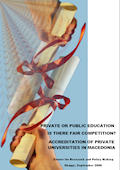


The present study is intended to provide a comprehensive assessment of the status of women in rural areas in the country as compared with the status of their male counterparts in rural areas and with the population of both men and women in urban areas, thus providing a baseline with which to design concrete measures leading to the empowerment of women in rural areas.The study provides an analysis of existing legislative and policy frameworks and explores the extent of the social exclusion of women in rural areas, including their exclusion from the labour market, from local public and social life, and from participation in local decision-making processes. In addition to voicing the needs and challenges of women in rural areas and highlighting the gaps that need to be addressed to improve their status, the study identifies the available opportunities to challenge the barriers these women face.This study thus encourages policy-makers to take stock of the disadvantages and challenges experienced by women in rural areas but also to look beyond these impediments and explore the potential these women have for their own advancement and for the development of their communities. The study offers insights into the needs and concerns of rural women and encourages local as well as national policy-makers and decision-makers to review community development from the perspectives of women in rural areas. It calls for local and national policies to be adapted to the realities faced by these women in order to remove the barriers they face on a daily basis. Last but not least, the study underlines the urgent need to ensure that rural women are included in key decision-making processes.
More...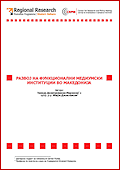
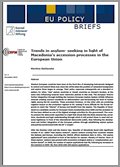
Keywords: asylum-seekers;
Western European countries have been at the front line of developing instruments designed to control and restrict flows ever since the 1970s when the problem of unwanted immigration and asylum flows began to emerge. Their policy responses subsequently set a standard or pattern for other, ‘new’ asylum countries or transit countries on Europe’s borders, at the same time influencing towards more restrictive policies in this area. The European Union’s further integration through building the Common European Asylum System (CEAS) influence towards creating common standards on determination and harmonizing the level of human rights among the EU countries. These processes however, on the other side are producing negative impact on the protection regimes in EU, making it more difficult for the forced migrants to reach the “shores” of Europe and benefit from the asylum. The Republic of Macedonia is a candidate country for European Union membership since 2005 and the accession to EU has been defined as one of the highest strategic priorities for the governmenti . The country present the democratic capacities in a light that shows that the State ensures law, procedure, standards and legal understanding through which it will protect those in need and ensures legitimacy in front of the international democratic public, thus following the development and further integration of the European policies through establishing asylum system and policies synchronized with the EU`s ‘acquis’.After the Bosnian crisis and the Kosovo war, Republic of Macedonia faced with significant number of so- called “new asylum seekers”, asylum seekers coming from countries outside the Balkans and Europe. According the UNHCR official statistical data in 2011, 740 asylum applicationsii were submitted in front of the Section for asylum- Ministry of interior. None of these asylum- seekers was granted with convention (refugee) status or complementary protection statusiii . In 2008, the number of asylum applications was 50, following by increases in the numbers in 2009- 90, then 2010 with 180 asylum applications.
More...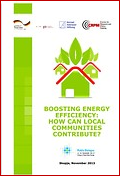
Keywords: energy-efficiency;
More...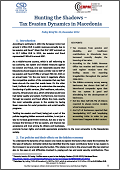
According to estimates in 2013 the European Union lost around 1 trillion EUR in public revenues annually due to tax evasion and fraud.Given that EUs’ GDP summed up to 12.7 trillion EUR in 2013, tax evasion and fraud represented 7.9% of its annual GDP. As a middle-income country, which is still reforming ist tax authority, tax system and related measures against tax evasion and fraud, one can reasonably assume that Macedonia should expect at least a similar rate to GDP of tax evasion and fraud (7.9%) or at least 700 mln. EUR on an annual basis.On the one hand, it negatively affects the competitive position of the companies that pay their taxes vis-a-vis the ones that evade taxes. On the other hand, it affects all citizens, as it undermines the everyday functioning of public services, (like healthcare, education, security, infrastructure etc.), which otherwise would have had better quality and extent. Furthermore, lost income through tax evasion and fraud affects the most, exactly the most vulnerable groups in the society by having fewer resources for social protection and social benefits programs.Tackling tax evasion and fraud, being just a part of the policies targeting hidden economic activities, is not just a way to increase government revenues, but also a way to increase the fairness of the tax system, and improve tax acceptance and trust among its citizens and businesses, promote human rights, and enable appropriate protection to the most vulnerable in the Macedonian society.
More...